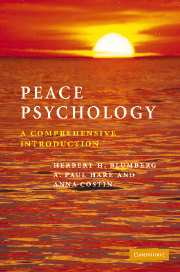Book contents
- Frontmatter
- Contents
- Preface
- Acknowledgements
- The scope, structure and content of this book
- Part I Introduction
- Part II Interdisciplinary practice
- Part III Primary psychological topics
- Part IV Core topics in peace and environmental studies
- 9 Conflict resolution
- 10 Emergency decisions, crisis management and the effects of conflicts
- 11 Nonviolence and peace movements
- 12 Peacemaking, wars and crises
- 13 The Middle East, Russia and other specific areas
- 14 Sustainable development
- Part V Terrorism
- References
- Index
13 - The Middle East, Russia and other specific areas
Published online by Cambridge University Press: 05 June 2012
- Frontmatter
- Contents
- Preface
- Acknowledgements
- The scope, structure and content of this book
- Part I Introduction
- Part II Interdisciplinary practice
- Part III Primary psychological topics
- Part IV Core topics in peace and environmental studies
- 9 Conflict resolution
- 10 Emergency decisions, crisis management and the effects of conflicts
- 11 Nonviolence and peace movements
- 12 Peacemaking, wars and crises
- 13 The Middle East, Russia and other specific areas
- 14 Sustainable development
- Part V Terrorism
- References
- Index
Summary
In this chapter we review research country by country and by region on the assumption that persons who wish to help reduce conflict in any of these areas may wish to know about the approaches that have already been tried and variables related to conflict resolution that have already been identified. However, with so many variables and so many articles it is rare to find two reports of research on the same subject. It is clear that some of the authors who discuss topics such as the cognitive complexity of peacemaking, cultural identity, trauma and the usefulness of intergroup workshops assume that their research has wider applications. Indeed, references to some of the same material appear in other chapters in this volume and some material related to a particular country, for example on children in Northern Ireland, only appears in another chapter. Thus all of the references to a given country could only be discovered by consulting the index.
For too many years, three areas of the world have had on-going conflicts in which religious and ethnic differences have played a prominent part: the Middle East with a focus on Israel and its neighbours, Northern Ireland and South Africa. More recently actions in countries that were parts of the former Soviet Union have revealed that ‘ethnic cleansing’ did not disappear with the fall of Nazi Germany in the 1940s. A few of these countries appear in the list of countries at the end of the chapter.
- Type
- Chapter
- Information
- Peace PsychologyA Comprehensive Introduction, pp. 162 - 198Publisher: Cambridge University PressPrint publication year: 2006



